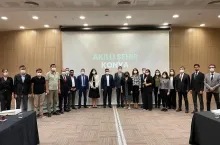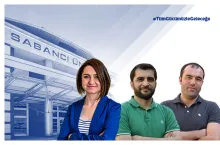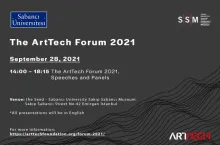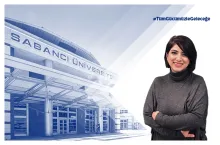A project coordinated by Ömer Ceylan, researcher at Sabancı University Faculty of Engineering and Natural Sciences (FENS) is entitled to receive support within the framework of the TÜBİTAK 1001 Program, The Scientific and Technological Research Projects Funding Program.

The project is entitled “Development of Process, Voltage and Temperature (PVT) Variation Aware Highly Energy-Efficient Deep Neural Networks (DNN) with High Inference Accuracy for Internet-of-Things (IoT) Applications.
Providing information about the aim of the project, Ömer Ceylan said the following: The aim of the project is to develop a timing error probability model that factors in process, voltage and temperature (PVT) variations to analyze and develop deep neural networks for energy-efficient IoT applications, and then build a platform that makes possible to design deep neural networks without having to go through the lengthy top-to-bottom (network level, architectural level, circuit level and even quantization level) simulations. By using this platform, two prototype integrated circuits composed of multiplier-accumulator (MAC) units first in 64x64 format, and then in 256x256 format will be fabricated using 65 nm CMOS technology, and the capabilities of the platform will be verified on these integrated circuits. Therefore, the goal of the project is to build a hardware development platform for energy-efficient deep neural networks where inference accuracy is not reduced (with maximum allowable reduction of 2%), factoring in PVT variations in case of low supply voltage, and to do this faster (100X faster than traditional gate-level simulations) by using statistical timing error models that we developed on our own and without requiring lengthy simulations. The platform that we develop will not be an alternative to the other techniques in use, instead, it can be used with them; it will rather be a cross-layer optimization platform that will make it possible to make a quick evaluation of the other techniques all together (various parameters such as the deep neural network to be used, type of data, data bit width, number of layers to be used in the deep neural network etc.). Efforts within the framework of the project will close an important gap in the literature by reaching a high level of inference accuracy in an energy-efficient way, factoring in all PVT variations, and using the most accurate timing error model, and doing all this very fast compared to classical gate-level simulations.”. Erdinç Öztürk and Öznur Taştan, faculty members of FENS are involved in the project as researchers. Emre Salman from Stony Brook University is advisor to the project.
Talking about the importance of the project, Ömer Ceylan said the following: Artificial intelligence is gaining new areas of application and growing in importance each day. It is used in healthcare for diagnosis, unmanned aerial vehicles, cars, industrial automation systems, call centers and many other businesses. Internet of Things (IoT) applications also have a growing field of application; data can be collected through sensors in locations far from the center, such data can be processed either on-site for immediate action or forwarded to a cloud, where processing is completed for further action. To enhance effectiveness of IoT applications, AI elements such as machine learning and deep learning are used in many IoT applications. Integration of deep learning method with mobile, wearable devices and other devices with edge computing and processing capabilities has been very popular in recent years. Particularly as a method frequently used in classification and pattern recognition applications, deep learning has attracted attention in recent years. In this way, opportunities offered by artificial intelligence can also be used in locations far from the center, and field of application of artificial intelligence keeps growing. In some applications, it is required to make right decisions as soon as possible, process data immediately and act according to the result of the operation. In such applications, it is necessary to complete the operations within a period of time shorter than the time it would take to send data to a center, wait for the data to be processed there, and then be sent back. In addition to shorten delays in internet of things applications, reducing band width, improving energy efficiency, and security are other requirements that justify relevance of on-site/edge computing and decision-making. Most of the IoT applications are devices which lack of a continuous source of energy, and in some cases, have to generate their own energy, therefore, they have to be energy-efficient. So, energy efficiency is of great importance for the use of deep neural networks, which have a widespread field of application, in IoT devices.
Development of energy-efficient and high-performance, quick deep neural network devices with high inference accuracy requires a cross-layer approach. These layers start at the circuit level, and go up to architectural and network levels. It is impossible to design and develop these layers independently from each other. The layers are strictly interconnected. Therefore, it is necessary to develop a responsive platform that considers all the layers. However, it takes a very long time to develop since it requires to optimize a very high number of parameters simultaneously in case the current gate-level digital circuit simulations are used, which impractical. Therefore, it is essential to establish a simulation infrastructure to accelerate this process, and use a model accordingly. For that purpose, a probability-based timing error prediction model will be developed to facilitate quick cross-layer simulation within the framework of this project. This model factors in PVT variations and detects timing errors accurately. The timing errors thus detected will be notified to the deep neural network as errors to see how the deep neural network works in such a case, and how inference accuracy will be impacted. Data inferred from this process will be used to correct the errors that must be corrected, and any other errors which can be tolerated by the deep neural network will be left uncorrected. Thanks to a platform which will operate in this way, it will be possible to develop deep neural networks with a cross-layer approach quickly. The platform will be used to develop energy efficient deep neural network hardware for use in IoT devices with an approach that uses highly accurate timing error models factoring in PVT variations in case of low supply voltage, hencemakes it possible to use different supply voltages for different layers of the deep neural network.




















